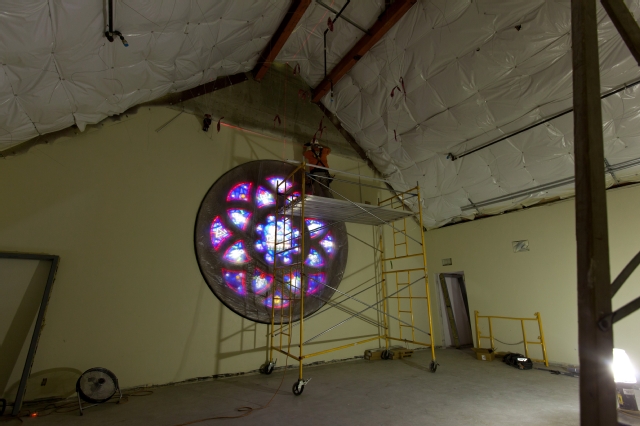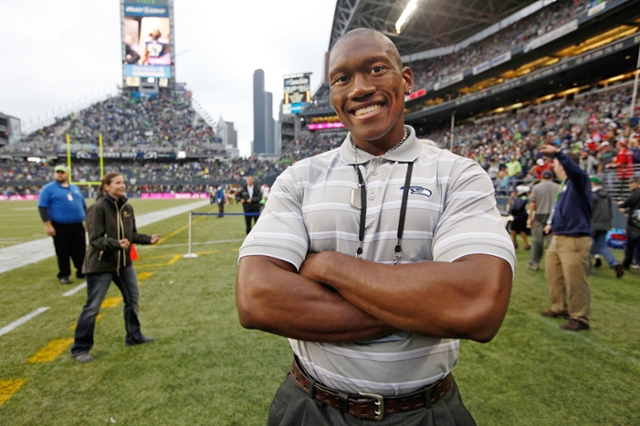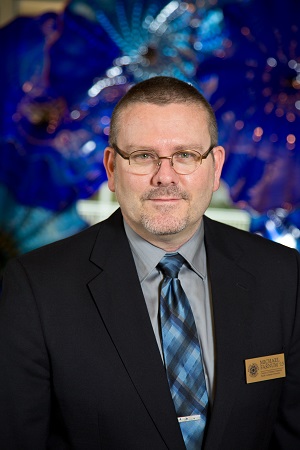Page 43 • (624 results in 0.023 seconds)
-

Work on the Ness Chapel and the Karen Hille Phillips Center for the Performing Arts continued through August, and will continue until just before students arrive. (Photo by PLU Photo Director John Froschauer) Construction on the performing arts center, dugouts and the halls continue throughout…
space with the office of Human Resources and the Marriage and Family Therapy program, as well as several new classrooms. Moving to lower campus, work continues on the softball dugouts, which will include new backstops, new drains and wiring in the fields, and a new scoreboard. The $500,000 project will be completed in September, Kaniss said. Students will notice refinished floors at Olson Auditorium and Memorial, as well as new wood floors and bleachers on the second floor of Olson. Upgrades are
-

Saved by the Ball: How Football Led Jahleel Barnes to PLU—and to the Seahawks As an intern for the Seattle Seahawks, Jahleel Barnes ’13 is a Lute living his dreams. Photo by John Froschauer / PLU By Barbara Clements Content Development Director At the age…
his heels in detention. Barnes wasn’t even sure whether he would stay in school, until his older brother hooked him up with the game of football. Then everything changed for Barnes, who now tops out at 6’3’’.“Football balanced me out,” he said just before he left with the Seahawks for New York City. “It saved me.” His grades improved, and he was hooked. He found a second family on the gridiron and eventually led Jackson High School in Mill Creek, Wash., to a state playoffs. When it came to
-

Pacific Lutheran University Introduces New Director of Military Outreach PLU Marketing & Communications Pacific Lutheran University welcomes its first-ever Director of Military Outreach, Army veteran and Tacoma resident Michael Farnum. PLU has a long history of collaboration with and service to the local and regional…
Military Outreach,” said Karl Stumo, Vice President for Admission and Enrollment Services. “Farnum’s 23-year military career and passion for helping veterans and military personnel in the south Puget Sound will help further distinguish PLU as a military-friendly institution. And his experience places him in a perfect position to articulate the academic excellence of the university as well as PLU’s commitment to veterans and military-affiliated personnel and their families.” PLU is ranked second in the
-

By Matthew Salzano ’18 PLU Communication Student TACOMA, Wash. (Nov. 26, 2014)—I woke up at 8:15 a.m. Nov. 7, 2014, to an email from Michael Bartanen, Chair of the Communication department, with the subject, “You’re famous.” I came to PLU intending to focus my Communication…
more human-interest-related. The same word is used to describe the sports anchor who accompanies play-by-play: Color commentators give expert analysis, player history and light anecdotes.) As The Mast’s A&E Editor, I knew finding color wouldn’t be a problem. Making stories PLU-centric, Lute-focused and engaging to an impatient audience is literally my job from week-to-week. When we arrived, the first quote was from the Second Amendment Foundation’s Director of Development—“60 to 70 percent” of
-

TACOMA, Wash. (March 26, 2015)—Megan Leibold ’13 and Anikka Abbott ’15 have more in common than Pacific Lutheran University: They both have won the title of Miss Pierce County. And not only that , but they also won back-to-back: Leibold won in February 2014 and…
Sound and decided to compete in Miss Pierce County after transferring to PLU. After winning that, Leibold went on to take second place at the Miss Washington pageant and won the award for Talent. Leibold graduated from PLU with a Bachelor’s of Music with a concentration in Vocal Performance and now teaches private voice and piano lessons at the Washington Academy of Music and sings with the jazz combo The Pit Crew in Tacoma. “I don’t think there is that appreciation of classical music; one thing I
-

TACOMA, Wash. (April 6, 2015)—Last year, Pacific Lutheran University’s undergraduate Education program achieved a 100-percent hiring rate, while the graduate program saw 90 percent of its students hired. On March 17, 18 school districts from around the state and 10 non-district organizations came to the…
students hired.On March 17, 18 school districts from around the state and 10 non-district organizations came to the Education Career Fair at PLU, coordinated by Career Connections, suggesting the hiring numbers will stay high for this year, too. At the fair, employers offered PLU students on-the-spot interviews, full-time positions and letters of intent for next year. Already, several PLU students have been offered positions at various districts. Elementary Education major Danay Jones ’15, second from
-

TACOMA, Wash. (Sept. 17, 2015)— Chinese President Xi Jinping is coming to Tacoma on Sept. 23—and Pacific Lutheran University Professor of Music Greg Youtz is playing a significant role in the international event. As chair of the Tacoma-Fuzhou Sister City Committee, Youtz was instrumental in…
PLU Music Professor Plays Instrumental Role in Chinese President’s Visit to Tacoma Posted by: Sandy Dunham / September 17, 2015 Image: PLU Professor of Music Greg Youtz (back row, second from left) joins elected officials and community leaders in welcoming the Honorable Qiu Yuan Ping, Minister of Overseas Chinese Commission (front row, fourth from left), to Tacoma’s Chinese Reconciliation Park. (Photo by John Froschauer/PLU) September 17, 2015 By Sandy Deneau DunhamPLU Marketing
-

TACOMA, WASH. (Feb. 5, 2016)- A familiar Pacific Lutheran University tradition changes its anatomy this year, as organizers reimagine “The Vagina Monologues” as “The Monologues” – a fresher, more interactive take on the famous play. Incorporating student-written content, “The Monologues” is a twist on the…
women’s health into conversation when so many people are scared to talk about it,” Gould said. In addition to holding two shows at PLU, the cast will also be taking “The Monologues” to the Washington Corrections Center for Women in Gig Harbor. There, PLU students will be doing two performances, one for the staff and a second for the inmates. It’s an opportunity made possible by the IF Project, an organization that works to help inmates share their own stories through theater. Smith said proceeds from
-

Dear Campus Community: It is with deep sadness that I share with you the news of the passing of PLU’s Provost and Senior Vice President for Academic Affairs, Dr. Rae Linda Brown. Rae Linda died Sunday morning, at peace surrounded by her family after a…
Program is a resource for faculty and staff. On Wednesday, Campus Ministry will host an informal community gathering at 12 p.m. on the second floor of Karen Hille Phillips Center. Members of the PLU community are invited to share thoughts, feelings, stories, music, or simply to gather with others in remembering and celebrating Rae Linda. Please join us to celebrate Rae Linda’s life and honor her memory on Monday, Sept 25, 6-7pm (followed by an open reception) in Mary Baker Russell Music Center’s
-

April Rose Nguyen ’19, ’21 has a plan. A political science and communication double major who recently earned an MBA at PLU, Nguyen followed the advice of a career adviser into a series of contract jobs in human resources. Not because she has career aspirations…
Games Read Next PLU becomes the second Washington university to join prestigious international studies organization COMMENTS*Note: All comments are moderated If the comments don't appear for you, you might have ad blocker enabled or are currently browsing in a "private" window. LATEST POSTS Caitlyn Babcock ’25 wins first place in 2024 Angela Meade Vocal Competition November 7, 2024 PLU professors Ann Auman and Bridget Haden share teaching and learning experiences in China November 4, 2024 Lutes
Do you have any feedback for us? If so, feel free to use our Feedback Form.


